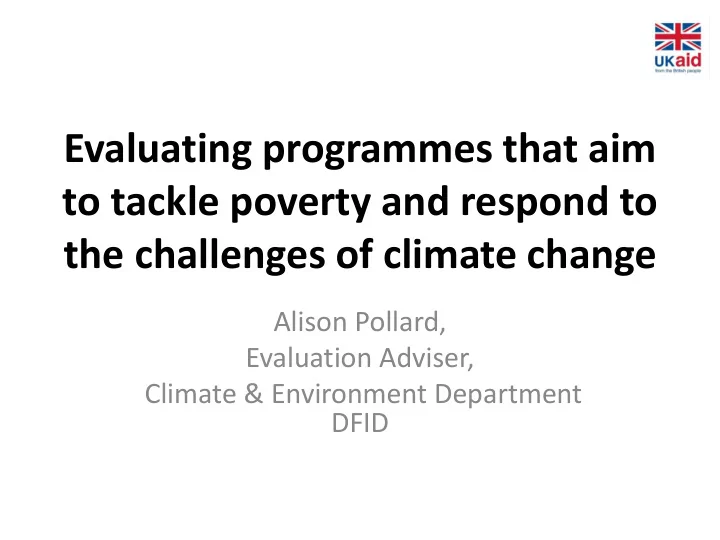

Evaluating programmes that aim to tackle poverty and respond to the challenges of climate change Alison Pollard, Evaluation Adviser, Climate & Environment Department DFID
The Global Challenge • One of the most urgent and pressing challenges facing the world • Epitomizes a ‘complex’ or ‘wicked’ problem • Exacerbates and has synergies with existing forms of inequality
The Context
The International Climate Fund Supporting international poverty reduction by helping developing countries to adapt to climate change, take up low carbon development and tackle deforestation. • Between 2010 and 2015, £3.8 billion has been invested • Over the next 5 years £6 billion is pledged • Over 180 programmes • Investments in 35+ countries
Some key challenges and opportunities 1) Complexity, diversity and scale of the fund 2) High level of de-centralisation and partnerships 3) We have evaluative evidence – rather than formal programme evaluations 4) Working with multilaterals and bilateral programmes ….a desire to learn about what works well, under different circumstances, for whom – how and why.
A four year £9.5 million programme Improve programme delivery and ensure the UK’s climate investments are informed by evidence and learning. Sharing results and lessons learned with Using a realist- our informed approach Developing Key programmes to identify areas of Performance and partners to evaluative enquiry indicators (KPIs) inform and subsequently programme evaluate the delivery & programme design
A realist informed evaluation Human Resources Philosophical/ Epistemological /Ontological implications Analysis, Synthesis Methodology
1 st step – develop nested theories of change… • Forestry, • Low Carbon Development • Well-being/resilience Participatory approach is crucial to identify key areas
Development of mid-level theories • Mid-level theories need to include context – mechanism – outcome configurations (CMOCs) • Iterative approaches to search secondary sources and use local expert groups to develop mid-level theories • These will be tested through the evaluation.
Then fieldwork can begin! • Use rapid realist reviews to engage with complex and diverse evidence base • Mixed method approaches Approaches that are relevant to investigating the mid-level theories Credibility and relevance are key terms here
Next steps • Development of frameworks for assessing the credibility and relevance of evidence (aligned with a realist approach – RAMESES) • An Evaluation Team leader • On-going and successful engagement with key audiences – to identify timely, appropriate and relevant activities • Exploring how we can most appropriately work with the concept of resilience
Recommend
More recommend